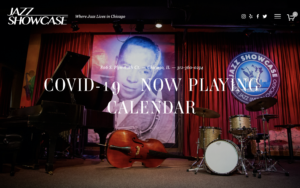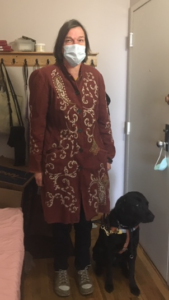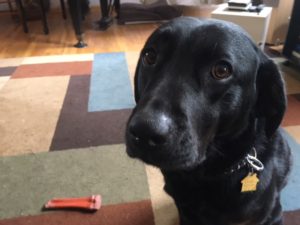Mondays with Mike: Gus ‘n’ Us
April 26, 2021 • 21 Comments • Posted in Mike Knezovich, Mondays with Mike, parenting a child with special needs, travelLast Saturday I got in a rental car (actually an enormous minivan—I know, oxymoron, but that’s what it was), figured out how to start the damn thing and put it into gear (I’m sorry, but shifting gears shouldn’t be done with a dial), stopped home to board Beth and Luna, and headed north.
To Watertown, Wisconsin. To see our son Gus in his group home. That used to be a routine, monthly occurrence. But, you know what happened. It’s been a long while.
Typically, we call the house on the drive up to let them know we’re coming—and to be sure they didn’t have some outing planned. But Saturday, the house phone was busy. And busy. And busy.
It’s common advice for those of us who have loved ones in the care of others to make unannounced visits…to check on their care. And early on we did that from time to time. But over time, our trust grew, and well, you know, we don’t really like sneaking up on people whom we’ve come to trust.
But this time we had no choice and we just showed up. Gus’ house is actually a duplex, with four bedrooms, a living room and a kitchen on each side. That way staff members can toggle between as necessary. But Saturday, when I rang the bell on Gus’ side, there was no answer. Between the phone being busy and not raising anyone despite knocking, my heart sank at the thought that maybe they were on an outing and we’d missed him.
I went to the other side, though, and this time a staff member opened the door. All the residents were just finishing lunch. I explained that we’d tried to call and she apologized—she had just realized the phone was knocked off the hook, and the other doorbell was broken. About that time a resident walked out of the bathroom in his birthday suit.
“Sorry,” the staff member said. “I’ll be right back.”
While she tended to business, I went back to the car to get Beth and Luna, and we joined Gus in his room for the first time in forever.
He looked great. He would’ve looked great after all this time no matter what, but his hair was groomed and he had recently been shaved—save for a thick, dark mustache. My nephew, upon seeing the picture, said “He’s rocking a Tom Selleck ‘Magnum P.I.’ stache!”
Way back—nearly 20 years ago—when Gus first moved away, when we visited we took Gus on outings. Typically to Culver’s, where he’d demolish a double cheeseburger. Then we’d take a ride with the radio blasting tunes.
That was fun, but I got older and weaker and he got bigger and stronger. Which meant I could no longer muscle him in and out of his wheelchair and in and out of the car like I used to do routinely.
So we’ve taken to just making house visits and sitting and talking with Gus. Now, Gus is a bit of an enigma. For example, he can see well enough to wind his way through doorways in his chair. But he only (as far as we know) has peripheral vision. So he doesn’t look at anything straight on. He cocks his head to look at us.
And when I said I talk to him, we don’t converse, exactly. Beth will provide an update about us and our families—he doesn’t understand but it’s enough for him to recognize that it’s Beth. Then I’ll say “Hi Gus!” in my best booming dad voice. He has always immediately recognized our voices and Saturday was no exception. He immediately smiled and laughed.
And then he just erupted, about every 10 seconds, with an excited roar of joy. Don’t know how else to explain it. We often match his odd sounds and he’ll reply, and that’s what we did. We put some music on and just chilled.
After goodbyes, Beth and I headed to Milwaukee where we stayed at Brewhouse Inn and Suites, a nice hotel in a renovated building from the old Pabst brewery campus. A pretty remarkable and historic little corner of Milwaukee: two thumbs and a paw up.
We could easily have made it home the same day but long ago, we adopted a policy of staying over night after visits. Mostly Milwaukee, sometimes Madison. In the early days, when Gus had moved away, visits were emotionally draining and the long ride home just felt empty and lonely. So we decided to give ourselves a treat with a stay at a nice place each time.
Visits are no longer taxing—Gus has been settled in for a long, long while. But it’s still fun to make a weekend of it.
This time we walked around the corner from the hotel to a modern microbrewery. We had a “Milwaukee charcuterie board,” which included local Usinger summer sausage, cheese curds, pub cheese, pickles and pretzels.
And we went to bed knowing, for certain, that Gus was safe and sound.
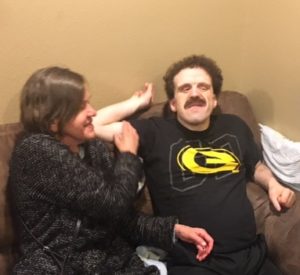
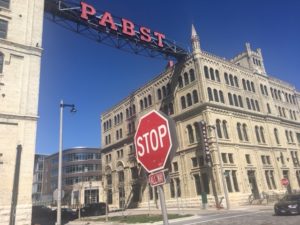
 personal care industry, Ted boasted a long and successful career that started with the small relaxer company his chemist stepfather launched in the 60’s and eventually sold to Revlon.
personal care industry, Ted boasted a long and successful career that started with the small relaxer company his chemist stepfather launched in the 60’s and eventually sold to Revlon.
